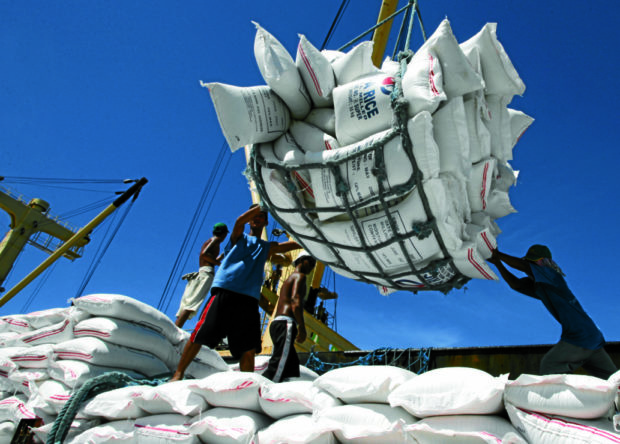Politicos may derail antipoverty plans

RICE IMPORTS The Duterte administration has disallowed government-to-government rice procurement in favor of private sector importation, but retained the quantitative restrictions. —INQUIRER PHOTO
(Last of three parts)
President Rodrigo Duterte’s socioeconomic agenda shows signs of promise, but so far, there have been no drastic reforms meant to cut poverty while sustaining economic growth, economists told the Inquirer.
Gilberto M. Llanto, president of the state-run Philippine Institute for Development Studies, said the markets appeared to have discounted the President’s often fiery and controversial statements because “what we are seeing is a prominent display of the resilience of the economy and its capacity for stronger growth in the near future.”
“If you go by the metric of macroeconomic fundamentals, the economy is on the right growth trajectory, given the so-called headwinds affecting it,” Llanto said.
But all the administration’s plans to cut poverty could be derailed if traditional politicians got in the way of growth and insisted on their agenda, Llanto warned.
Article continues after this advertisement“A good thing is the clear target on poverty reduction given by the administration. Tying Odysseus to the mast is a good thing. This will put a strong focus on inclusive growth and the requisite measure to achieve those targets,” he said.
Article continues after this advertisementDutertenomics
Llanto said the administration was doing fine with the proposed tax reforms, but it was Congress that was attempting to water it down.
“This must be stressed to the public,” he said.
While the administration is sincere in its efforts, there is concern that certain “politicos, who have the capacity to support or frustrate those efforts,” pose a problem, Llanto said.
However, Foundation for Economic Freedom (FEF) president Calixto Chikiamco said more work would have to be done, citing the supposed underperformance by the administration’s so-called “Dutertenomics.”
“Let me cite some economic statistics: unemployment in January was 6.6 percent, the highest in two years. Inflation last month was 3.1 percent, slightly down from 3.4 percent from April, which was the highest in two years.
“The latest self-rated poverty statistics of Social Weather Stations showed an increase in the people describing themselves as poor to 50 percent, or half of the population,” Chikiamco said.
Slight drop in growth
He said economic growth slightly dropped last year, disappointing some, while public spending remained flat.
“One thing to look out for is that consumption spending was down, which could have been due to higher inflation or some other factor that worries about employment,” he said.
He added that while agriculture showed a robust 5-percent growth, it was merely a rebound because the sector contracted by more than 4 percent from the year before.
“Agriculture was also helped by the lack of major typhoons and good weather. The environment for mining was negative, due to the antimining policies of former Environment Secretary Gina Lopez,” Chikiamco said.
Game-changing reforms
He also said the Duterte administration had simply not carried out game-changing economic reforms in its first year.
He noted, for instance, the lack of reforms in the rice sector.
“The administration had a chance to make a major, consequential reform in rice policy, but it lacked the courage to do it,” he said.
While Cabinet Secretary Leoncio Evasco Jr. and the economic managers finally prevailed over the National Food Authority (NFA) and disallowed government-to-government rice procurement and instead favored private sector importation, they still retained quantitative restrictions.
This meant that importation would still be capped and rice prices kept higher than it should be.
It also allowed the NFA to retain its legal monopoly and gave it the power to issue limited permits to the private sector for importation, which could be a source of favoritism and corruption, Chikiamco said.
Not to mention that keeping quantitative restrictions would also be a violation of the country’s World Trade Organization commitments, thereby courting possible sanctions from the trade governing body.
The FEF president said the ideal reform would have been to abolish the legal monopoly of the NFA, liberalize the importation of rice and impose a reasonable tariff, with the tariff revenue going to helping rice farmers to increase productivity or to diversify.
Telco sector
Chikiamco also lamented that “there has also been no movement with respect to improving competition” in the telecommunication sector.
As for the plan to lift foreign investment restrictions, he said “it has been all talk with little concrete action,” as “there has been no movement to curtail the foreign investment negative list.”
On foreign aid, Chikiamco said the President’s rush to relying on Chinese official development assistance (ODA) might make the Philippines more vulnerable to pressure from China over sovereignty issues in the South China Sea.
While the US economy has strengthened with its lowest unemployment in years, China has to grapple with its “overleveraged economy,” he said.